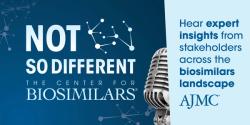© 2026 MJH Life Sciences™ and The Center for Biosimilars - Biosimilars, Health Economics & Insights. All rights reserved.
Lawrence Shulman, MD: Preparing for Biosimilar Trastuzumab
Lawrence Shulman, MD, deputy director for clinical services and director of the Center for Global Cancer Medicine at the Abramson Cancer Center at the University of Pennsylvania, discusses the arrival of biosimilar trastuzumab.
Transcript:
Trastuzumab has been one of the great advances in breast cancer care over the last several decades. When it was approved in 2005 as an adjuvant therapy for patients who had HER2-positive breast cancer, the mortality rate for those patients went down by almost 50%. There are very few things that we’ve done in cancer medicine that have had such a dramatic effect on overall survival.
But it’s a very expensive drug, and the estimates are that it’s about $40,000 for a course of adjuvant therapy, and that’s a strain on the health system and it’s certainly a strain on patients and their families as well.
Biosimilars have started to come on the market, and I think they’ve been brought on the market very responsibly. The companies have done good trials to show that the effectiveness and the toxicity protocols and profiles are equivalent to what we’re seeing with the native Herceptin from Roche and Genentech. On the other hand, the biosimilars have not dropped the price substantially.
While we’re anxious to see them come on the market and we’re looking forward to competition driving the price down some, we’ve really not seen that effect yet in the [United States] or elsewhere in the world.



